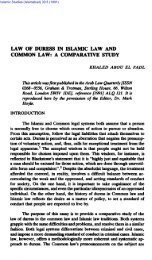THE ECONOMIC DILEMMA OF THE MUSLIM WORLD
THE ECONOMIC DILEMMA OF THE MUSLIM WORLD
THE ECONOMIC DILEMMA OF THE MUSLIM WORLD
You also want an ePaper? Increase the reach of your titles
YUMPU automatically turns print PDFs into web optimized ePapers that Google loves.
Islamic Studies 35:3 (1 996) 297<br />
which he applied to every economic experiment whether within or without<br />
Germany.<br />
However, human reality is to be explained, not on the basis of a single<br />
equation but of a double equation:<br />
(1) Biological Equation puts a man on an equal footing with his<br />
fellow human being in any place, so that he is able to do what another man can,<br />
though certain individuals may be superior to others in certain respects.<br />
(2) Social Equation differs from one society to another, and within<br />
a society from onc period to another according to the degree of development or<br />
backwardness.<br />
As for the first equatioo, it is bestowed by God; He created man of the<br />
goodliest fabric and distinguished him with honour above all in the world (see<br />
Qur'2n 3:95). It is a gift granted by Him, the Mighty and the Exalted, to the<br />
entire mankind.<br />
As for the second equation, it is a gift of society to all its members.<br />
Like a common denominator, it stamps their behaviour and defines the degree<br />
of their effectiveness in confronting difficulties in a way which distinguishes<br />
them from the members of another society or from another generation of their<br />
society, provided the time gap is sufficient to stamp the society with another<br />
style, conforming to a different social equation.<br />
It should be mentioned that from an economic point of view, there are<br />
two sources of social equation: the society we have designated as the northern<br />
hemisphere and the other, which we have designated as the southern<br />
hemisphere. Each of them stamps the behaviour of their individuals with a<br />
definite degree of effectiveness. We can consider the latter as a measure of the<br />
capability of the individual to command, according to his milieu, the means of<br />
social life. Such capability differs today from Washington-Moscow axis (the<br />
northern hemisphere) where civilisational power prevails, to Tangier-Jakarta<br />
axis where such power makes default, as if a sum-total of fundamental<br />
conditions had intervened tacitly, to determine the attitude of the individual in<br />
facing problems and subsequently, the outcome of this attitude. The sum-total<br />
of these conditions forms what we have termed social equation. It tacitly<br />
conditions the attitude of the individual and its rcsults, subjecting the latter to a<br />
sort of inevitability. evoked perhaps by our susceptibilities.<br />
But if' we grasp the nature of this inevitability. we might realise the<br />
extent of its hold on our conduct at the present time and the extent of our<br />
freedom with regard to it. Such a realisation would help us whenever we decide<br />
to change our social equation by means which have allowed other societies to<br />
change it like Japan at the end of the last century or China in the middle of the<br />
present century.<br />
Let us make two suppositions:<br />
(1) A new-born baby arrives on the Washington-Moscow axis. It<br />
will decidedly submit, from the very first moment, to the law of big numbers,<br />
that is, the law of satistics. Thcre would be for it, as a child, in education and<br />
health care and, as an adult, in employment, a share in proportion to the extent
















